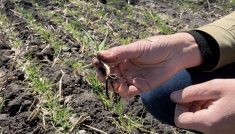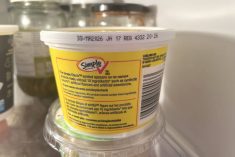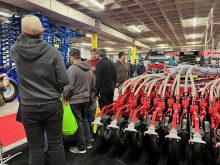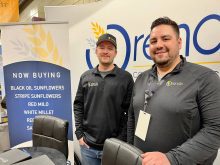Monsanto and Novozymes are partnering to develop and commercialize biological products to boost worldwide crop production, company officials announced during a telephone news conference Dec. 10.
Their new “BioAg Alliance” brings Novozymes’ commercial BioAg operations, including microbial discovery, development and production together with Monsanto’s microbial discovery, advanced biology, field testing and commercial capabilities, the companies said.
Microbial-based products are derived from naturally occurring micro-organisms such as bacteria and fungi. They can protect crops from pests and enhance plant productivity and fertility, the companies said.
Biological-based products can also get to market faster than more heavily regulated traditional chemical-based pesticides.
Read Also

Farm Credit Canada forecasts higher farm costs for 2026
Canadian farmers should brace for higher costs in 2026, Farm Credit Canada warns, although there’s some bright financial news for cattle
“(M)icrobial solutions offer tremendous potential to deliver sustainable, cost-effective solutions that can increase yield using less inputs,” the companies said.
Monsanto is well known for its seed business and its popular non-selective herbicide, Roundup (glyphosate). Novozymes is a major player in biological products, including JumpStart, an inoculant that grows along the root, making more phosphate available to the plant.
Biological products will play an important role in an integrated approach to boosting crop production along with plant breeding, biotechnology, chemicals and agronomics, Monsanto’s chief technology officer Robb Fraley told reporters.
Weeds and other pest are evolving and climate change is also expected to affect crop production, he said.
“I think for me it really points to the importance of having multiple new tools in the challenge of controlling new bugs and weeds,” he said.
Resistance challenge
Monsanto is already working on “BioDirect,” a new approach to killing herbicide-tolerant weeds using RNAi technology — the “i” stands for “interference.” It makes herbicide-tolerant weeds susceptible to the herbicides they had been able to survive, Fraley said.
“It restores the effectiveness of a number of herbicides, including Roundup, the ALS-type chemistries and the HPDP-type chemistries,” he said.
“There is a lot of innovation possible in the genomics and microbials space,” Fraley said. “Again, we’re really excited about how these new tools can be applied, to both let us test and characterize and produce and target fields with exactly the right products.”
Western Canadian farmers will be getting some of the alliance’s new products, especially with corn and soybean acres expanding, said Trevor Thiessen, Novozymes vice-president and head of BioAg.
“It is an important area for our research and development program today and we anticipate that we will be going forward with those crops grown in Western Canada,” he said, noting that JumpStart was discovered in Western Canada.
Monsanto and Novozymes will maintain independent research programs to identify microbials for agriculture. Novozymes will be responsible for production and supply of microbials. Monsanto will lead field testing, registration and commercialization.
The companies will co-manage the alliance and co-fund research and development efforts and share the profits.
Monsanto will take over marketing Novozymes’ current products.
The BioAg Alliance is subject to the approval of national antitrust authorities, but is expected to be approved early next year.















